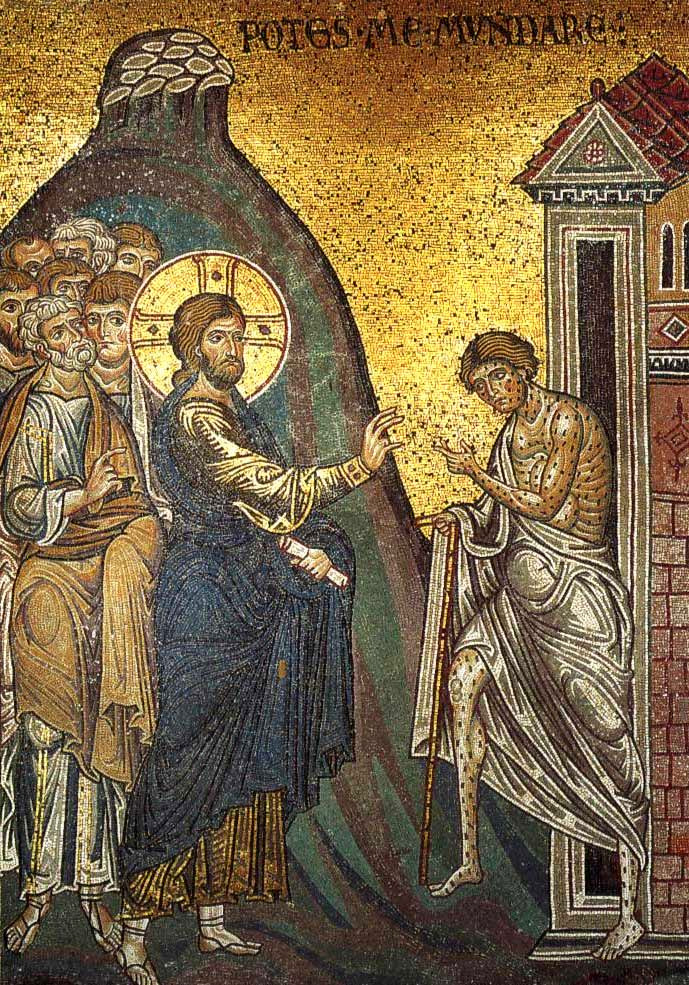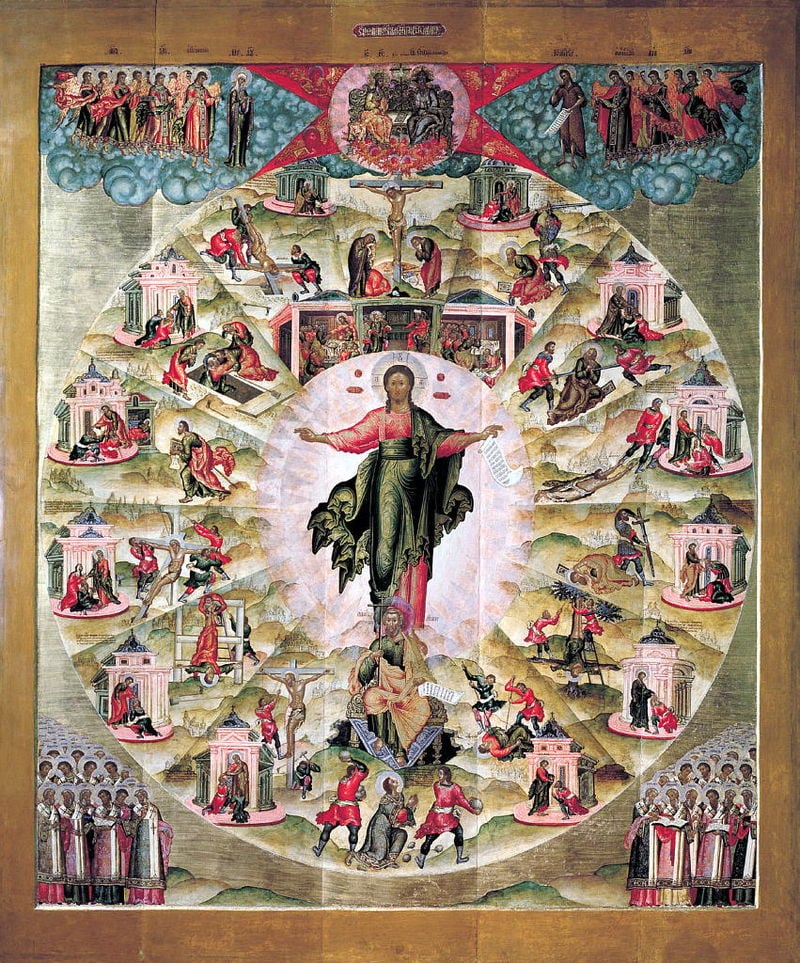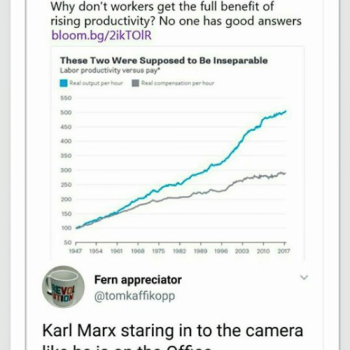Prefigurative politics is the act of living by the ethics and organization of the future society you want to create. It is often employed by communist and anarchist groups who wish to demonstrate that the way of life they seek in a post-revolutionary world is in some sense possible in the here and now. To “form the structure of the new society within the shell of the old,” according to the IWW.
Prefigurative politics has a history that stretches back much further than most Leftists know; it was in fact one of the defining aspects of the Kingdom of God movement instituted by Jesus of Nazareth. The very structure of Jesus’s ministry was meant to suggest the organization of society after the cataclysmic apocalypse that would usher in the new age, toppling all power structures of man and replacing them with the Kingdom of God.
If this sounds like a revolution, that’s because it is. Jesus himself may or may not have expected this revolution to come through divine intervention (I remain unconvinced), but its final identity is especially clear if one looks at what the Kingdom of God looked like in praxis.
I learned the term “prefigurative politics” during an appearance on the podcast Friendly Anarchism, which looks at Christianity through a Quaker anarchist lens. Host Katherine and I discussed anarchism, Marxism, the Bible, Christian origins, and argued over the Bolshevik Revolution (the centenary of which is upon us). You can listen to the podcast episode here:
…while you read these five examples of prefigurative politics within the radical ministry of Jesus.
Free Eating
One of the most common criticisms lobbed at Jesus within the gospels was his association with “sinners and tax collectors.” Very early in gospel history we are told:
“As he sat at table in [Levi’s] house, many tax collectors and sinners were sitting with Jesus and his disciples; for there were many who followed him.” (Mark 2:15)
Jesus’s inclusive meal practice has long been noted by scholars such as Marcus Borg, John Dominic Crossan, EP Sanders, and NT Wright as one of the more radical aspects of his ministry. It was one thing to provide “sinners” – generally understood as those who were ritually unclean and made little to no effort to follow Jewish dietary laws (possibly because those laws could be prohibitively expensive for the destitute) – with food as charity; it was another to invite them to your table.
When Jesus and his disciples sat and ate with the dregs of society, he was simultaneously lowering himself to their level and raising them to his (and rabbis and healers were very well-respected in Second-Temple Jewish society). It was a signal that by participating in the Kingdom, these sinners had been made clean. Were Jesus overly concerned with the Law, he would have referred these outcasts to the Temple, or implored the publicans to find a new profession. Instead, he invited them to dinner, and they followed him.
Free Healing
This is similar to the last examle, but with a more specific purpose. Jesus’s “healings” of various ailments (along with his exorcisms) are best understood not as miraculous cures for disease, but as prophetic cures for illness.
Western culture doesn’t really differentiate between disease and illness, but cross-cultural anthropology does. I am a materialist and a naturalist, so I don’t believe in miracle cures, but I do believe that what Jesus’s healings accomplished was even more impressive.

Illness and disease were considered by many Jews of Jesus’s time to be divine punishments for impurity or sin. They were seen as the fault of the afflicted, and only by adherence to the laws of the Temple cult could healing be achieved. Jesus’s prefigurative politics subverted this assumption.
Jesus opposed the idea that the healing nature of God was limited to a single temple in a single city (and administered by priests complicit in the imperialism of Rome). The Kingdom of God was all-encompassing, and to demonstrate this, Jesus’s disciples and even total strangers were also able to heal in his name. This shows the absolute negation of hierarchical power structures even within Jesus’s own ministry. If you followed The Way, you could do anything Jesus did.
Prophets and Householders
This is a not-often-discussed feature of the organization of Jesus’s ministry, but it is crucial to understanding it*. Consider this passage from Luke.
After this the Lord appointed seventy others and sent them on ahead of him in pairs to every town and place where he himself intended to go. He said to them, “The harvest is plentiful, but the laborers are few; therefore ask the Lord of the harvest to send out laborers into his harvest. Go on your way. See, I am sending you out like lambs into the midst of wolves. Carry no purse, no bag, no sandals; and greet no one on the road. Whatever house you enter, first say, ‘Peace to this house!’ And if anyone is there who shares in peace, your peace will rest on that person; but if not, it will return to you. Remain in the same house, eating and drinking whatever they provide, for the laborer deserves to be paid. Do not move about from house to house. Whenever you enter a town and its people welcome you, eat what is set before you; cure the sick who are there, and say to them, ‘The kingdom of God has come near to you.” (Luke 10:1-9)
The story of the seventy apostles has no direct parallels within the New Testament, but it does have an interesting partial-parallel within the Gospel of Thomas, a very early apocryphal gospel with layers that may predate the synoptics.
In any case, following context clues, this passage tells us even more than we notice at first glance. The significance of Jesus sending his followers out “in pairs” with “no purse, no bag, no sandals” is that he was advertising their dependence on the settled householders in the villages of Galilee. They were to minister to those who for whatever reason could not literally follow Jesus around, and in return they would be given food and a bed.
This was Jesus’s way of announcing and prefiguratively displaying the Kingdom of God. After the revolution, healing would be brought to the people instead of the people going to be healed. Their only payment was to share freely of their food and drink. This communistic interdependence of itinerant ministers and settled householders is best understood as a form of a mutual aid society. It was more than pragmatism; it was a conscious subversion of human society as composed of individual self-reliant families, which was fast becoming the norm in the Mediterranean world. Which brings us to our next point…
Brothers, Sisters, and Mothers
I have written before about how the concept of “the family” is treated within the Kingdom of God. The parallels with the way someone like Friedrich Engels thought of the family are startling. I will recap here in brief:
Since ancient times, the Hebrews were a tribal people following a tribal religion. But by the time of the 1st century CE, ten of the twelve of Israel’s great tribes were destroyed and this old tribal identity was being supplanted by the concept of the familia, no doubt as a result of constant imperial subjugation by western Mediterranean powers. But while tribal society maintains a largely egalitarian (at least in theory), communistic way of life, the family, as shown by Engels, develops alongside private property. With it comes patriarchy and hierarchy.
Jesus declared, in Nazareth, that “Whoever does the will of God is my brother and sister and mother.” He railed against the family and expected his disciples to abandon their biological families as well. He understood, on some level, that the family as it existed then and as it exists today is a structure that serves only to maintain the subjugation of the propertyless by the propertied; women by men; nobility against peasantry. Individual families were abolished in the Kingdom of God, and all followers were one family together.
Seriously, read Marxist literature on the subject. It’s terrifying how well it fits with Jesus’s teachings.
Communal Living
After the death of the Lord, some of his followers settled in Jerusalem. Acts reports:
“Now the whole group of those who believed were of one heart and soul, and no one claimed private ownership of any possessions, but everything they owned was held in common. There was not a needy person among them, for as many as owned lands or houses sold them and brought the proceeds of what was sold. They laid it at the apostles’ feet, and it was distributed to each as any had need.”
Some Christians who are uncomfortable with the fact that the earliest Christians were communists make feeble arguments that this lifestyle was something that only the disciples were meant to do, that it no longer applies, or that it was completely voluntary and nobody had to do it. To which I reply: if you’re a Christian, you should also be a disciple; where in the Bible does it say we no longer need to live the way Jesus and the disciples did; and even if that is true, then why aren’t you doing it yourself?

Looking at Jesus’s ministry, including the Jerusalem commune, with an understanding of prefigurative politics leads to a different conclusion. Peter and James and the other leaders of the commune may have expected an immanent and climactic consummation, but it is clear that they were still continuing Jesus’s ministry in the way they thought was best. The itinerant ministers continued to proselytize and the householders continued to feed them. The message was still brought to the poor, the unclean, the lowly. The faithful in Jerusalem continued to display the Kingdom of God in praxis for all to see, and this is a feature of what made Jesus’s message and movement so inspiring and enduring. It’s why we still know his name today, and this fact shows that a commitment to prefigurative politics is integral to the success of any revolutionary movement today.
~~~
*John Dominic Crossan makes the historical case for this across three books (The Historical Jesus: The Life of a Mediterranean Jewish Peasant; Jesus: A Revolutionary Biography; and The Birth of Christianity). Crossan pours exhaustively over all available contemporary texts as well as utilizes an interdisciplinary method combining cross-cultural anthropology with a meticulous historical method to arrive at these conclusions. Anyone interested in understanding the organizational structure of Jesus’s ministry should read these three books, in that order.












